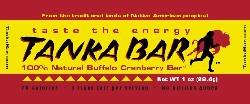The Tanka Dog is a hot dog made from buffalo and wild rice. Initially, it will only be available for food service sales, according to the Tanka Bar blog
The company, which is based on the Pine Ridge Reservation, introduced Tanka Bar, an energy bar made from buffalo meat and cranberries in 2007.


4 comments:
On the one hand, I'm glad to see a tribal-owned business. On the other, "traditional" and "protein bar" don't belong in the same sentence. But it is good to see Indians actually selling it still; definitely an improvement over what happened with quinoa a few years back.
The logo avoids stereotypes, even the stereotypes that would make sense (e.g., if the man, supposedly a Lakota, had long hair).
The traditional Lakota diet was high in protein and very low in fat, sodium and "bad" carbohydrates, therefore I see no conflict nor contradiction of sorts in the use of "traditional" and "protein bar" - although nowhere in this post do I see the word "traditional."
I would eat this hotdog on a whole wheat bun "Chicago-style" with organic vegetables and I'd go easy on the celery salt.
I was more referring to the fact that protein bars are typically made from combining "isolated macronutrients" with supplemental micronutrients. Not exactly what I'd call a tasty treat.
I wouldn't characterize raw liver as "very low in fat", either. But other than the calories, fat itself isn't really a problem, and, as has been pointed out many times, American men have replaced 4.5 grams of fat with about 100 grams of carbohydrate in the last thirty-odd years. (American women ate more of both.) With diabetes, the problem is simply refined carbohydrates, with maybe a side of trans fat.
Raw liver was but an insignificant nutritional component of the over-all traditional Lakota diet, often eaten as you have pointed out, in raw form just moments after the animal had died - and shared as a delicacy among the most skilled hunters on that particular day.
In comparsion to the horrendous foods available through the USDA Commodities Program on almost all reservations, any improvement in dietary options (even by way of state-of-the-art protein bars) should be hailed as a most welcome alternative.
Post a Comment